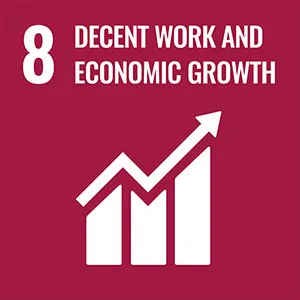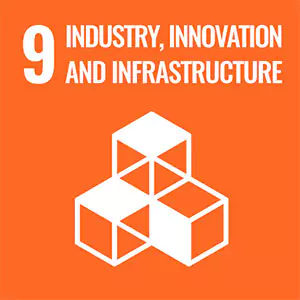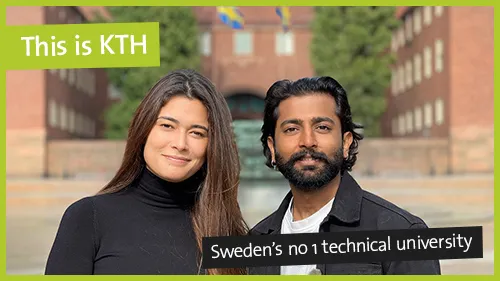MSc Nanotechnology
Nanotechnology is an exciting field within science and technology related to materials and device structures with characteristic dimensions in the nanometer regime. You will learn to design, fabricate, measure, model and apply materials, devices and circuits with unique properties and functions relevant to semiconductor chip technologies. Graduates face vast career opportunities as the field penetrates several technology sectors, such as electronics, communication, medicine and energy.

Nanotechnology at KTH
The master's programme in Nanotechnology focuses on semiconductor chip-based components and systems with applications in electronics, photonics and microsystems technology. Based on fundamental semiconductor physics, the aim is a good understanding of the function and manufacture of semiconductor components as well as their integration into advanced systems at the chip level. In addition, great importance is placed on the understanding and handling of advanced analysis methods for both material and component properties. The programme is closely linked to the extensive research activities at the KTH Electrum laboratory , a world-leading resource for the education, research and product development related to micro and nanofabrication. It is also closely connected to the Albanova Nanolab , which is a physics research centre operated jointly by KTH and Stockholm University.
The degree project allows you to carry out an in-depth study within their specialisation and demonstrate the skills acquired during their studies. It can be carried out at an academic or industrial institution, needs to be relevant to the main field of study for the master's degree, and is scheduled for the last semester of the programme.
This is a two year programme (120 ECTS credits) given in English. Graduates are awarded the degree of Master of Science. The programme is given mainly at KTH Campus in Stockholm by the School of Electrical Engineering and Computer Science (at KTH).
Courses in the programme
The courses in the programme cover topics such as semiconductor physics, materials analysis methods, semiconductor devices, photonic materials and devices, integrated circuit design and manufacturing, scientific methodology and societal implications.
Courses in the master's programme in Nanotechnology
Future and career
The master's programme in Nanotechnology prepares you for a career in a wide range of areas in semiconductor and microsystem technologies, materials science, and applied physics. Applications related to, for example, electronics, photonics, the Internet of Things and life sciences offer plenty of exciting job opportunities in high-tech companies. The programme focuses on advanced nanoscale characterisation tools, and the unique experience of a state-of-the-art academic cleanroom environment will make you very competitive in the job market. Graduates with a specialisation in semiconducotor device technologies and nanoscale materials are well equipped to handle the sustainability challenges of modern society. These are also major academic research fields, and the programme provides a solid foundation for graduate studies at highly ranked universities, including KTH and several prominent universities throughout Europe and USA.
Sustainable development
Graduates from KTH have the knowledge and tools for moving society in a more sustainable direction, as sustainable development is an integral part of all programmes. Nanotechnology as a subject area has a strong inherent connection to sustainability aspects in that it represents a technological leap based on scientific innovations towards increasingly energy-efficient and high-performance components and systems, improved IT solutions (for example allowing for reduced travelling), while allowing for a general and more resource-efficient and sustainable energy management, environment and infrastructure. In this way, many of the programme's courses have an implicit link to sustainable development and explicitly state it in their learning objectives. As such, the programme addresses many environmental and societal challenges. Three key sustainable development goals that can be considered particularly relevant by the master's programme in Nanotechnology are:



Good Health and Well-being: Nano and semiconductor technologies allow for new medical diagnostic tools and therapy schemes as well as environmental sensing and imaging of hazardous materials and gases. It is also instrumental in down-scaling lab-on-a-chip systems for high-efficiency, large throughput medical diagnosis. Finally, it is also essential in developing Internet-of-Things (IoT) solutions that can allow for automatic health monitoring or self-diagnosis/treatments.
Decent Work and Economic Growth: Automation and advanced manufacturing methods greatly improve working conditions and business margins, and rely on ever-more sophisticated computing, communication and sensing systems. These developments take account of new materials, devices and integration schemes that are driven by innovations in Nanoelectronics and Nanophotonics.
Industry, Innovation and Infrastructure: Nanotechnology and semiconductor chip technologies are currently among the fastest-growing industry sectors worldwide and has tremendous innovation potential. The programme establishes and strengthens the knowledge base for education and future business opportunities in rapidly moving "high-tech" fields of clear benefit to society.
Faculty and research
Due to the cross-disciplinary character of the master's programme in Nanotechnology, it involves faculty, courses and resources from several schools, research departments and centres at KTH:
- School of Electrical Engineering and Computer Science: Department of Electrical Engineering
- School of Engineering Sciences: Department of Applied Physics
- School of Electrical Engineering: Department of Micro and Nanosystems
- The Electrum Laboratory
- The Albanova Nanolab







